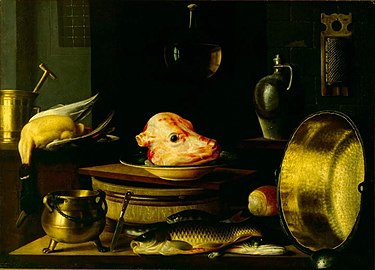| Great Vanity | |
|---|---|
| French: Grande Vanité | |
 | |
| Artist | Sebastian Stoskopff |
| Year | 1641 |
| Medium | oil painting on canvas |
| Movement | Baroque painting Allegory Still life |
| Subject | Vanity |
| Dimensions | 125 cm × 165 cm (49 in × 65 in)[1] |
| Location | Musée de l'Œuvre Notre-Dame, Strasbourg |
| Accession | 1931 |
The Great Vanity is a 1641 Baroque allegorical still life painting by the Alsatian artist Sebastian Stoskopff. It is on display in the Musée de l'Œuvre Notre-Dame. Its inventory number is MBA 1249 ("MBA" stands for Musée des Beaux-Arts).[2][1]
The painting is the last, largest, and most ambitious of Stoskopff's vanitas still-lifes, and the sum of his painterly achievements at this point in his career (Stoskopff had just settled again in his hometown of Strasbourg, after many years in Paris). Among the multiple symbolic elements of its iconography relating to the frailty of existence and death, it quotes an engraving by Jacques Callot, depicting a jester.[2][1] The three elaborate hanaps in the upper left edge of the painting are faithful depictions of works by Stoskopff's brother-in-law Nicolas Riedinger, a master goldsmith in Strasbourg since 1609.[3] The whole composition consciously repeats Stoskopff's slightly morbid Kitchen Still Life with a Calf's Head from 1640 (see below), which had already been a Memento mori of sorts.[4]
A poem in German written with chalk on a board hanging from the left side of the table reveals the meaning of the painting:
Kunst, Reichtum, Macht und Kühnheit stirbet
Die Welt und all ihr Tun verdirbet
Ein Ewiges kommt nach dieser Zeit
Ihr Toren, flieht die Eitelkeit.[2][4]
(Art, Wealth, Power and Audacity die
The World and all its Doing perish
Eternity arrives once this Time is over
Fools that you are, run away from Vanity)
-
Kitchen Still Life with a Calf's Head (Saarland Museum Saarbrücken)
- ^ a b c Dupeux, Cécile (December 2013). Musée de l'Oeuvre Notre-Dame. Arts du Moyen-Âge et de la Renaissance. Strasbourg: Éditions des Musées de Strasbourg. p. 188. ISBN 9782351251058.
- ^ a b c Dupeux, Cécile (December 1999). Strasbourg - Musée de l'Oeuvre Notre-Dame. Paris: Éditions Scala. pp. 94–95. ISBN 2-86656-223-2.
- ^ Dupeux, Cécile; Gatineau, Barbara (April 2015). D'argent, de nacre et d'os. Strasbourg: Musées de la ville de Strasbourg. ISBN 978-2-3512-5132-4.
- ^ a b Kolodziej, Beate (20 November 2019). "Alles schwindet – Zum Motiv der Vergänglichkeit in der Bildenden Kunst". Opus Kulturmagazin. Retrieved 30 August 2020.
